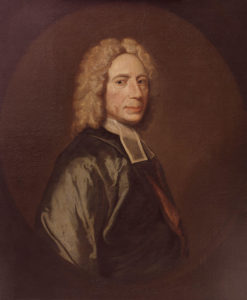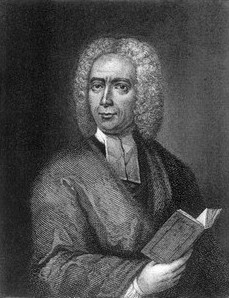Nonconformist Christian
Isaac Watts is best known for authoring popular hymns sung throughout Protestant churches today. He was a Christian minister and regarded as the father of English hymnody. Born in 1674 in Southampton, England to a family of religious nonconformists, his father was arrested twice for his views. Watts developed a talent for rhymes at an early age which continued throughout his life. He attended King Edward VI School and learned Latin, Greek, and Hebrew.
 As a nonconformist, Watts attended Dissenting Academy in an area that is now part of London. After his education, he became assistant minister of Mark Lane Congregational Chapel in London and became full pastor in 1702. Due to health issues, Watts visited Abney Hall to recuperate and was invited to stay where he lived for 30 years until his death in 1748.
As a nonconformist, Watts attended Dissenting Academy in an area that is now part of London. After his education, he became assistant minister of Mark Lane Congregational Chapel in London and became full pastor in 1702. Due to health issues, Watts visited Abney Hall to recuperate and was invited to stay where he lived for 30 years until his death in 1748.
Isaac Watts’ Legacy
His legacy is an extensive body of work covering treatises, educational writings, essays, and cherished hymns. As Protestantism began to take hold, his work was influential with nonconformist independents and religious revivalists. His educational books were widely used throughout the 18th century covering geography, astronomy, grammar, and philosophy.
Watts is known for introducing a new style of hymnody, one that included poetry for “original songs of Christian experience” to be used in worship, according to Marini, a sacred music scholar. Traditionally, hymns were based on Psalms, but his new style launched a new era of English worship with other poets following in his footsteps.
Published Hymns of Praise
 His beloved hymns were written while ministering at Mark Lane and have become a part of Protestant Christian heritage. His first collection of hymns and lyrics was published in 1706. In 1707, he published Hymns and Spiritual Songs that included “When I Survey the Wondrous Cross.” He also published children’s songs in a collection published in 1715, Divine Songs for the Use of Children.
His beloved hymns were written while ministering at Mark Lane and have become a part of Protestant Christian heritage. His first collection of hymns and lyrics was published in 1706. In 1707, he published Hymns and Spiritual Songs that included “When I Survey the Wondrous Cross.” He also published children’s songs in a collection published in 1715, Divine Songs for the Use of Children.
Famous hymns by Isaac Watts include:
“Alas! and did my Saviour bleed” (1707)
“Am I a Soldier of the Cross” (1724)
“Come, Let Us Join Our Cheerful Songs” (1707)
“Come, We Who Love the Lord” (1709)
“Cradle Hymn”
“From All That Dwell Below the Skies” (1762)
“Jesus Shall Reign Where’er the Sun” (1719)
“John Was The Prophet Of The Lord” (1707)
“Joy to the World” (1709)
“Let Every Mortal Ear Attend” (1707)
“Our God, Our Help in Ages Past” (1719)
“There Is a Land of Pure Delight” (1707)
“When I Survey the Wondrous Cross” (1707)
“Who dares attempt th’ Eternal name” (1705)
==> Also learn about Jan Hus – 15th Century Reformer.


